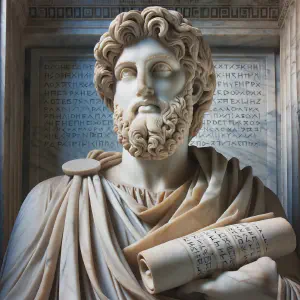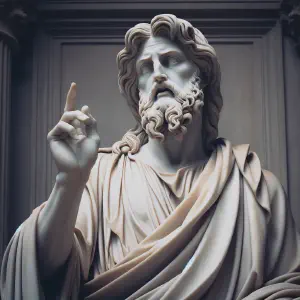The Path of Wisdom and Light



The story culminates in a profound realization that true wisdom is often misunderstood by the world. Jesus’ message highlighted that wisdom’s validity is proven by her deeds. Despite the criticisms and misunderstandings, the transformative works of Jesus and John the Baptist stood as a testament to the wisdom of God’s ways. In a world of shifting morals and perspectives, the story invites all to seek the unwavering light of divine wisdom, promising a life of spiritual prosperity and eternal significance.
Five Questions
What is the significance of God referring to Himself as a teacher and redeemer in the Isaiah passage?
God’s self-description as both a teacher and redeemer is deeply significant. As a teacher, He imparts wisdom and guidance, showing His people the path to righteousness and blessing. The role of redeemer underscores His commitment to saving His people from their sins and missteps. This dual role highlights the nurturing and salvific aspects of God’s relationship with humanity.
How does the Psalmist’s analogy of a tree planted near water relate to a righteous person’s life?
The Psalmist uses the tree as a metaphor for the life of a righteous person. Just as a tree planted by streams of water is nourished and flourishes, so too does a person who delights in God’s law. This imagery conveys stability, growth, and the bearing of fruit, symbolizing a life enriched and sustained by adherence to God’s teachings.
In Jesus’ parable in Matthew, why does He compare the generation to children in a marketplace?
Jesus uses the parable of the children in the marketplace to highlight the fickleness and unresponsiveness of the generation. The children’s refusal to engage with either joyous or mournful tunes represents how the people neither accepted John the Baptist’s asceticism nor Jesus’ more inclusive approach. This reflects their reluctance to embrace divine wisdom in its various forms.
What does Jesus mean by saying, “wisdom is vindicated by her works”?
By saying “wisdom is vindicated by her works,” Jesus is emphasizing that the truth and value of wisdom are proven through actions and outcomes. Despite the criticisms and misunderstandings faced by both John the Baptist and Himself, their transformative actions and the positive effects of their ministries validate the divine wisdom they embody and preach.
How do these passages collectively guide a Christian’s understanding of living a righteous life?
These passages collectively offer a multifaceted understanding of living a righteous life. Isaiah underscores the importance of heeding God’s teachings, the Psalm emphasizes the prosperity and stability that comes from delighting in God’s law, and Jesus’ words in Matthew reveal the challenges and misunderstandings that can accompany a life of divine wisdom. Together, they encourage Christians to pursue a life guided by God’s commandments, rooted in faith, and resilient in the face of worldly misjudgments.
Bible Study
Isaiah 48:17-19
Thus says the LORD, your redeemer,
the Holy One of Israel:
I, the LORD, your God,
teach you what is for your good,
and lead you on the way you should go.
If you would hearken to my commandments,
your prosperity would be like a river,
and your vindication like the waves of the sea;
Your descendants would be like the sand,
and those born of your stock like its grains,
Their name never cut off
or blotted out from my presence.
In these verses, Isaiah, a major prophet in the Old Testament known for his prophetic visions and strong faith, conveys a message from God, who is portrayed as the redeemer and teacher. God’s role as a teacher aligns with the Catholic value of divine guidance, emphasizing the importance of following God’s commandments for a prosperous and righteous life. This aligns with the Catholic teachings on the importance of obedience to God’s will, as outlined in the Ten Commandments and Catechism, stressing the value of following divine guidance for moral and spiritual prosperity.
Psalm 1:1-2, 3, 4 and 6
R. (see John 8:12) Those who follow you, Lord, will have the light of life.
Blessed the man who follows not
the counsel of the wicked
Nor walks in the way of sinners,
nor sits in the company of the insolent,
But delights in the law of the LORD
and meditates on his law day and night.
R. Those who follow you, Lord, will have the light of life.
He is like a tree
planted near running water,
That yields its fruit in due season,
and whose leaves never fade.
Whatever he does, prospers.
R. Those who follow you, Lord, will have the light of life.
Not so the wicked, not so;
they are like chaff which the wind drives away.
For the LORD watches over the way of the just,
but the way of the wicked vanishes.
R. Those who follow you, Lord, will have the light of life.
This Psalm, traditionally attributed to King David, a central figure known for his heart after God, contrasts the lives of the righteous and the wicked. The righteous man, who delights in the law of the LORD, is likened to a tree planted by streams of water, symbolizing spiritual nourishment and stability. This reflects Catholic values of meditating on and living according to Scripture, as encouraged in the Catechism. The imagery of a flourishing tree mirrors the Catholic understanding of grace – a life nourished by God’s word is stable and prosperous. The fate of the wicked, likened to chaff, underscores the transient nature of a life devoid of God, reflecting the Catholic teaching on the importance of righteous living.
Matthew 11:16-19
Jesus said to the crowds:
“To what shall I compare this generation?
It is like children who sit in marketplaces and call to one another,
‘We played the flute for you, but you did not dance,
we sang a dirge but you did not mourn.’
For John came neither eating nor drinking, and they said,
‘He is possessed by a demon.’
The Son of Man came eating and drinking and they said,
‘Look, he is a glutton and a drunkard,
a friend of tax collectors and sinners.’
But wisdom is vindicated by her works.”
In this Gospel passage, Jesus Christ, the central figure of Christianity, known for His parables and teachings, addresses the crowd with a parable. He compares the generation to children in a marketplace, illustrating the people’s unwillingness to respond to John the Baptist and Himself. This parable underscores the Catholic value of wisdom, as found in the Catechism, emphasizing the importance of recognizing and responding to God’s presence in various forms. Jesus’ reference to ‘wisdom being vindicated by her works’ aligns with Catholic teachings on the importance of good deeds as a manifestation of faith, resonating with the concept of faith working through love, as emphasized in the Catholic tradition.
Lessons
These passages collectively teach us about the profound grace and guidance of God. Isaiah reminds us of God’s role as our teacher and redeemer, emphasizing the blessings that follow obedience to His commandments. The Psalm contrasts the prosperous life of the righteous, who delight in God’s law, with the fleeting existence of the wicked. In the Gospel, Jesus illustrates how true wisdom, often misunderstood or overlooked by the world, is justified through its transformative actions. These teachings call us to a life of faith and wisdom, rooted in the eternal truth of God’s word and exemplified by righteous living and an unwavering commitment to His teachings.
Meditation Prayer


